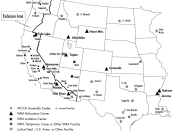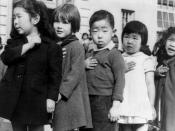The Supreme Court decision in Korematsu v. United States (December 1944) approved internment of Japanese Americans on a claim of " Military necessity"- the possibility of a Japanese attack on America's West Coast. The war power of congress and the executive to exclude those of Japanese ancestry from the west coast war area in which one's home is located is a far greater deprivation than constant confinement to the home from 8 p.m. to 6 a.m. Nothing short of apprehension by the proper military authorities of the gravest imminent danger to the public safety can constitutionally justify either. We are dealing here with the case of imprisonment of a citizen in a concentration camp solely because of his ancestry, without evidence or inquiry concerning his loyalty and good disposition towards the United States. Our task would be simple, our duty clear, were this a case involving the imprisonment of a loyal citizen in a concentration camp because of racial prejudice.
Korematsu was not excluded from the Military Area because of hostility to him or his race. He was excluded because we were at war with the Japanese Empire, because the properly constituted military authorities feared an invasion of our West Coast and felt constrained to take proper security measures, because they decided that the military urgency of the situation demanded that all citizens of Japanese ancestry be segregated from the West Coast temporarily, and finally, because Congress, reposing its confidence in this time of war in our military leaders as inevitably it must determined that they should have the power to do just this...We cannot by availing ourselves of the calm perspective of hindsight now say that at the time these actions were unjustified.
The primary Source I have chosen is from Japanese-American Internment Camps during War World II. The United States feared that where residents of Japanese ancestry lived had to be removed from their homes along the coast and relocated in isolated inland areas. As result President Roosevelt signed Executive Order 9066, which resulted in the internment of 120,000 people of Japanese ancestry. That was relocation authority was created to administer the assembly centers, relocation centers, and internment camps, and relocation of Japanese-Americans begin in April 1942. Tule Lake, in northern California was one of the most infamous of the internment camps. Prisoners there held frequent demonstrations and strikes demanding their rights under the U.S. Constitution.
The Second Primary source is from an Article Interment of San Francisco Japanese for the first six months of 1942, carried almost daily reports of FBI and Police sweeps, and the various proclamations, plans and restrictions to civil liberties Japanese-Americans wanted to be free and have the rights just like the American. The residents were forced from the so-called "Little Tokio," or Japan town, district. There are many types of different articles for example Concentration Camps for Japanese wanted by Western Governors and many more.
As American-Citizens I would support it in 1944 because the American feared that the Japanese ancestry was going to attack them in their homes, cities, and residential area. During WWII the Japanese attack Pearl Harbor and destroy many of the naval ships. Because the Japanese put feared in us when they bombed Pearl Harbor and that is why we cannot trust the Japanese-American we put there into internment camps so that they can be separated from us. In my conclusion that Japanese-American fell left out because what their country did to the U.S. Pearl Harbor ships and now they are suffering what their country did to the Americans.


